Ramadan 2024 UAE Schedule: Key Dates and Insights
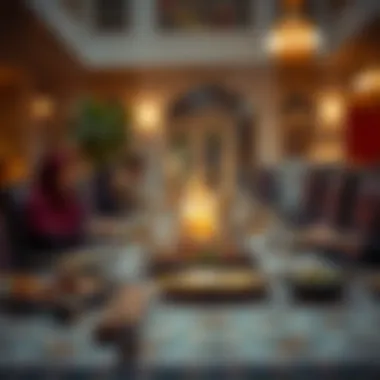

Intro
As Ramadan approaches in 2024, individuals and families across the UAE prepare to embrace the holy month with open arms. It's a time steeped in rich traditions, spiritual reflection, and community, not to mention a notable impact on day-to-day life and the economy, particularly within Dubai's real estate sector. The significance of Ramadan stretches far beyond fasting; it intertwines with personal routines, cultural norms, and even buying decisions for those dabbling in property investments.
With the crescent moon marking the start of this sacred month, key dates and prayer times become essential guideposts. For many, the connection to their faith shapes daily schedules and interactions. Meanwhile, investors and homebuyers tune in to how the market behaves during this period.
As the calendar pages turn, this article seeks to provide a detailed roadmap of the Ramadan 2024 schedule specific to the UAE. From significant prayer timings to cultural practices and how Ramadan influences real estate transactions, readers will gain valuable insights tailored for investors, expatriates, and anyone engaged with Dubai's ever-evolving property landscape.
By systematically analyzing trends and implications within these domains, we aim to equip our audience with a comprehensive understanding, preparing them for a month that seamlessly blends spirituality and pragmatism.
Prelude to Ramadan
Ramadan holds a pivotal place not only in the heart of millions of Muslims around the globe, but especially within the cultural fabric of the UAE. It is a month where devotion and communal spirit intertwine, creating an atmosphere steeped in reflection and resolution. The significance of this period goes far beyond abstaining from food and drink; it engenders a unique rhythm of life, influencing social dynamics, economic activities, and personal routines.
Historical Significance of Ramadan
The historical context of Ramadan is founded on the belief that the Quran was first revealed during this month, marking it as a time of spiritual enlightenment. This event, which is pivotal in Islamic teachings, offers a lens through which one can understand the essence of Ramadan. The month serves as a reminder of the compassion and self-discipline shared within communities while instilling the spirit of humility among individuals.
In the UAE, this historical backdrop resonates deeply with the local populace. Families come together, narrating stories passed down through generations about the significance of each action during this month. Moreover, it's a time when many strive to recreate similar acts of kindness and charity as those exemplified by the Prophet Muhammad, weaving cultural identity and historical reverence into daily practices.
Ramadan Observances in the UAE
In the UAE, Ramadan is observed with a fervor that transforms daily life. The sights and sounds of the month resonate throughout the Emirate's cities, as streets come alive during the evening hours after Iftar—the meal that breaks the fast. Mosques, adorned with lights, become beacons of community gathering; evenings are filled with prayers, discussions, and cultural exchanges.
The portrayal of Ramadan in the UAE is manifold. Each Emirate showcases its unique blend of local traditions and modernity. For instance, the vibrant Iftar tents set up in hotels, parks, and public spaces invite people from differing backgrounds to share meals, emphasizing inclusivity and a sense of belonging.
Ramadan is not just a month; it's an experience that builds bridges among diverse cultures and fosters communal ties.
As the UAE garners a multicultural populace, Ramadan observances are infused with a melting pot of global traditions, enabling expatriates to partake in local customs, thus broadening their understanding of the holy month. Through these observations, the UAE embodies the very spirit of Ramadan—community, compassion, and a commitment to spiritual growth.
Ramadan Dates for
Understanding the dates of Ramadan in 2024 is crucial for Muslims in the UAE, as it sets the tone for the entire month of fasting, prayer, and reflection. This holy month not only plays a significant role in the spiritual lives of many but also poses various implications for social gatherings and business practices in the region. The specifics of the dates allow ventures and families alike to plan their activities, whether that be managing investments, celebrating family traditions, or partaking in community events. With Ramadan being a time for generosity and community spirit, keeping track of the exact timings becomes essential for engagement and participation.
Start Date and Moon Sighting
The start of Ramadan hinges on the lunar calendar, making it dependent on the sighting of the new moon. Officially, the UAE's authorities will announce the commencement after a moon sighting, which usually occurs on the evening before Ramadan begins. Expect the UAE's Islamic Affairs and Charitable Activities Department to spearhead this announcement. The anticipated start date for Ramadan in 2024 is likely on the evening of March 10, 2024. However, the actual date can fluctuate slightly depending on moon visibility, even causing variations between countries or regions. This element of uncertainty adds a layer of reverence to the commencement, encouraging communities to come together and observe the sky in anticipation.
End Date and Eid Al-Fitr
As Ramadan comes to a close, the end date is equally important, marking the day of Eid Al-Fitr, a joyous occasion celebrating the completion of fasting. Eid is expected to take place on April 9, 2024, signifying a marked transition from contemplation to celebration. The days leading up to Eid are imbued with a spirit of generosity, where zakat al-fitr, a form of charity given before Eid prayers, becomes a primary focus. In the UAE, families prepare to festively celebrate by gathering for prayer at mosques, sharing meals with loved ones, and, for many, exchanging gifts. The significance of this festivity extends beyond personal joy; it presents a lucrative opportunity for local businesses, especially in retail and hospitality, as consumer sentiment shifts from austerity to celebration.
"Ramadan is a time for spiritual reflection, but also pivotal for community and economic life in the UAE."
Additionally, the bright lights and decorations of the UAE cities transform significantly as Eid approaches, drawing attention from expatriates and tourists alike. Not only does this period foster communal bonds, but it encourages interaction across different cultures. Therefore, knowing the end date helps businesses predict consumer behavior, ensuring they meet the demand generated by the festive spirit.
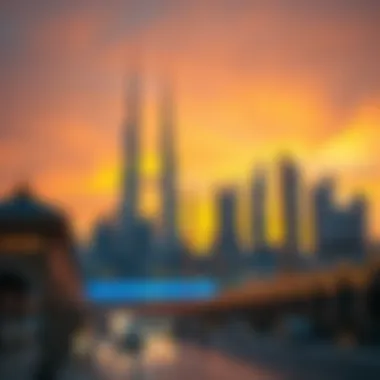
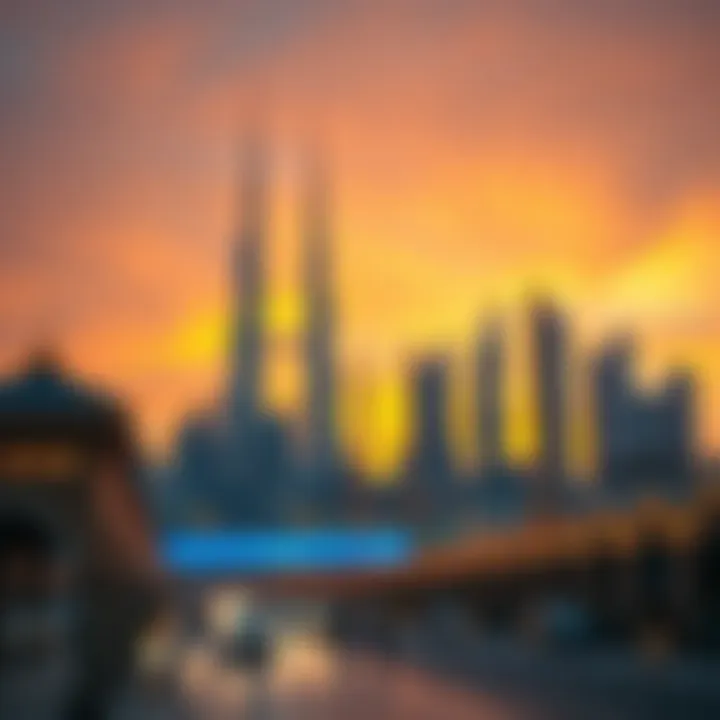
Daily Ramadan Schedule
Understanding the Daily Ramadan Schedule is fundamental for anyone keen on observing this holy month effectively, particularly those in the UAE. The schedule is more than just a timetable; it acts as a guide, shaping the daily routines of Muslims and influencing their spiritual and social activities. For expatriates and investors, knowing these timings can provide valuable insights into how business operates and social life unfolds during this significant period.
The fasting ritual, which runs from dawn until sunset, has a profound impact not only on personal health and spirituality but on community dynamics and even market activities. Therefore, the succeeding sections delve into specific prayer times and the corresponding etiquettes associated with them, balancing reverence with practical needs.
Suhoor and Fajr Prayer
Suhoor, the pre-dawn meal, holds its place of importance, offering nourishment to sustain one through the day. This meal isn't just a necessity; it's often surrounded by family and community warmth. Many families gather to eat together, ensuring that everyone is energized for the day ahead.
As the sun begins to rise, Fajr Prayer signifies the official start of fasting. The timing of this prayer varies throughout Ramadan, typically just before dawn. The alignment of Fajr with the Suhoor meal underscores the connection between nourishment and spiritual awakening. Often, a sense of calm envelops the morning atmosphere, setting the tone for reflective thoughts, family bonding, and personal devotion.
Iftar Timing Considerations
As the sun goes down, the anticipation builds for Iftar, the meal to break the fast. In the UAE, Iftar often occurs moments after Maghrib Prayer, which usually happens just after sunset. Knowing the exact timing is crucial, as the start of Iftar is marked by the consumption of dates and water, a tradition that harkens back to the practices of the Prophet Muhammad.
Considerations regarding timing can also adapt according to local variations. Communities may gather at different locations to celebrate the occasion, which can affect traffic and public activities. For investors and realtors, being aware of these fluctuations aids in making informed decisions regarding potential ventures—whether it’s planning community events or gauging the best times to host meetings.
Maghrib and Isha Prayers
Following Iftar, the Maghrib Prayer is traditionally performed. This prayer not only marks the evening but also serves as a time for gratitude and reflection. It’s an opportunity to come together with friends and family, emphasizing unity within the community. In the UAE, Isha Prayer follows, usually a little while after Maghrib, encompassing a time of personal supplication and closure of the day's spiritual journey.
Adjusting daily routines around these prayer times reflects respect and adherence to spiritual practices, even in a fast-paced living environment. For expatriates, aligning business meetings after Iftar or avoiding scheduling conflicts with prayer times can prove beneficial—facilitating smoother interactions and better relationships.
In summary, the Daily Ramadan Schedule emphasizes the cycles of fasting and prayer, shaping interactions and routines for individuals and communities across the UAE during this sacred month.
Cultural Practices During Ramadan
Ramadan serves as a pivotal period for Muslims around the world, and in the UAE, it becomes a unique blend of spiritual reflection, community bonding, and cultural festivities. Understanding these cultural practices offers not just insight into religion but also a glimpse into the social fabric that interweaves Emirati life during this holy month.
Iftar Gatherings
The breaking of the fast at sunset, known as Iftar, is a central moment of the day during Ramadan. Families often come together to share this meal, where dates and water traditionally lead the feast. This act isn't just about nourishment; it's about uniting hearts and tables under the sacred sky. In the UAE, this communal spirit flows like a river.
Many restaurants and hotels set up lavish buffets dedicated to Iftar, showcasing a variety of culinary delights, from traditional Emirati dishes to international fare. These gatherings are not just limited to family; friends, colleagues, and even complete strangers may be invited, illustrating the essence of communal sharing.
“The beauty of Iftar is in its ability to gather people, transcending boundaries and bringing them together.”
In addition, multiple charitable organizations arrange communal Iftar events to feed the less fortunate, reinforcing the idea of generosity and compassion that is at the heart of Ramadan. Being part of such gatherings fosters a sense of belonging and shared gratitude.
Charity and Community Service
The spirit of giving permeates the atmosphere during Ramadan. Zakat, or obligatory almsgiving, is encouraged, and many choose this month to fulfill their charitable commitments. The act of giving not only assists those in need but also enhances spiritual growth for the giver. Throughout the UAE, there are many initiatives encouraging donations, whether it's time, money, or resources.
Community service also plays a critical role. Many organizations mobilize volunteers to distribute food packs or organize outreach programs for impoverished families. In these acts, the lesson that we are all responsible for each other resounds loud and clear. It's a call for unity in a fast-paced society.
Benefits of Charity in Ramadan:


- Strengthens community bonds by fostering mutual respect and support among residents.
- Enhances personal satisfaction and mental well-being for those who give.
- Provides essential relief to those facing hardships, especially in a region prone to extreme weather fluctuations.
Festive Events in the UAE
As Ramadan unfolds, various festive events spring up across the UAE, showcasing its rich culture and heritage. From Ramadan tents offering traditional setup for Iftar to vibrant markets bustling with artisanal goods, the festive atmosphere broadens the cultural horizon. Cultural centers often host events featuring poetry, music, and art focused on Islamic heritage.
In cities like Dubai and Abu Dhabi, illuminated displays and decorations adorn public spaces, adding a magical ambiance. Many of these events also include contests and exhibitions that emphasize traditional crafts, thus preserving Emirati history and customs.
Another notable mention is the Ramadan markets, where one can find an array of products from local artisans. It becomes a melting pot of creativity, community spirit, and culture, drawing people from diverse backgrounds.
In summary, the cultural practices during Ramadan in the UAE are not solely about religious observance; they reflect a deep-rooted ethos of togetherness, charity, and celebration. From shared meals at Iftar to spirited community service, every aspect resonates with the core values of compassion and unity, offering both locals and expatriates a unique experience during this sacred month.
Impact on Daily Life in the UAE
Ramadan is not just a month of fasting and prayers; it is a period that brings various changes to the rhythm of life in the UAE. This sacred month influences a multitude of aspects from daily routines to social interactions. Understanding the nuances of these shifts can aid in navigating everyday life in a more informed manner.
Changes in Work Hours
During Ramadan, adjustments to work hours are commonly made, reflecting the unique nature of this holy month. Government entities and many private sectors often adopt a shortened work schedule to accommodate fasting.
- Typical Work Hours: Most offices run on a six-hour schedule, usually from 9 AM to 3 PM, providing employees enough leeway to manage their indulgences.
- Government Guidelines: The UAE government usually announces official timings to ensure a cohesive structure across various sectors.
- Flexibility in Private Sector: While many businesses align with the government’s hours, some may maintain longer hours, particularly in retail or hospitality sectors, where customer demands remain high.
The shift to shorter workdays can lead to a more relaxed atmosphere in workplaces, where colleagues may share iftar meals together after sunup. This communal aspect of Ramadan can strengthen relationships among employees, fostering a sense of unity.
Public Behavior and Etiquette
The expectation of behavior shifts considerably during Ramadan, instilling a range of etiquettes that everybody, residents and visitors alike, should observe.
- Respectful Conduct: One of the cardinal rules during this month is refraining from eating, drinking, or smoking in public spaces during fasting hours. This shows respect not only to those who are fasting but also to the cultural norms that govern daily life during this month.
- Dress Codes: While the UAE is known for its relatively relaxed dress code, Ramadan can prompt a shift toward more conservative attire. Opting for longer sleeves and avoiding overly casual clothing in public spaces is seen as a nod to the holy atmosphere.
- Community Sensitivity: Engaging in noisy activities, loud music, or public displays of affection can be frowned upon. Instead, embracing a quieter demeanor aligns well with the spirit of reflection and spirituality prevalent during this time.
“Adapting to these social norms not only showcases respect but also enriches one’s experience while navigating life in the UAE during Ramadan.”
Overall, these behavioral adaptations create a harmonious environment. They not only reflect the values upheld by the Islamic community but also encourage a respectful coexistence among different cultural backgrounds in the UAE.
Real Estate Trends During Ramadan
The real estate market in the UAE experiences distinct variations during the holy month of Ramadan. This period, deeply rooted in spiritual reflection and community engagement, influences various aspects of everyday life, including buying and selling properties. Investors, homebuyers, and realtors need to be aware of these fluctuations and trends to make informed decisions.
Market Activity Fluctuations
During Ramadan, the pace of real estate transactions tends to slow down compared to other months. Potential buyers often prioritize spiritual observances, family gatherings, and charity initiatives, which can shift their focus away from property hunting. However, this doesn't mean the market comes to a complete stop. In fact, certain segments remain vibrant. For instance:
- Luxury properties: High-end residential areas may see continued interest, as affluent buyers engage in transactions.
- Rental market: Many expatriates and locals look for short-term leases or renew existing ones, especially as families prefer stability during Ramadan.
- Investors’ deals: Savvy investors might seize opportunities presented by market slowdowns to negotiate better prices, particularly in developments nearing completion or those that have recently been vacated.
"Ramadan is a unique time. While the market may seem quiet, opportunities linger just beneath the surface for those willing to look."
Investment Opportunities
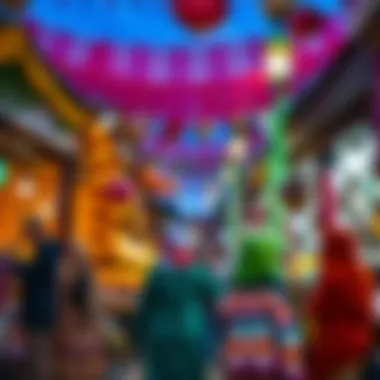
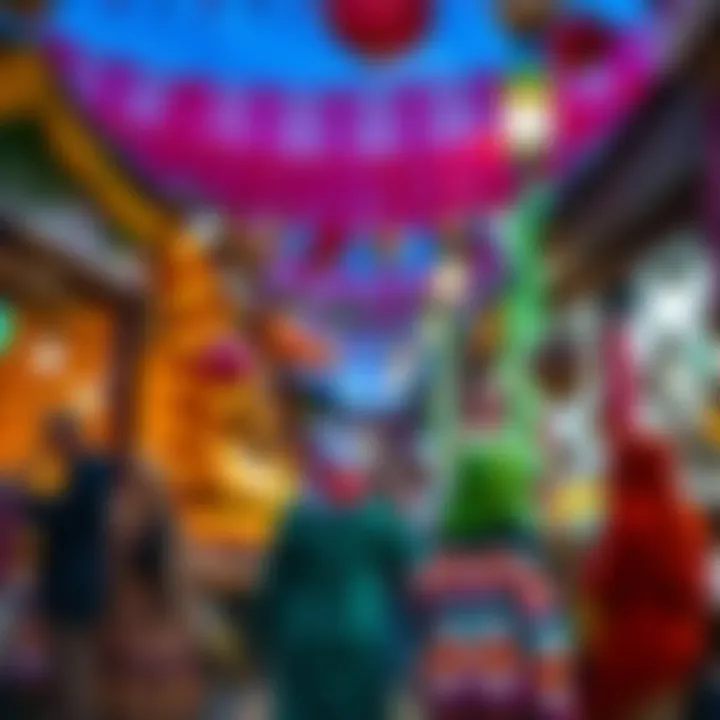
The observance of Ramadan opens up specific investment avenues that can be advantageous for those in the real estate sector. Notably, with the influx of visitors during Eid Al-Fitr, there is often a spike in demand for short-term rental properties. Investors who prepare their properties to cater to holiday travelers can benefit significantly. Furthermore:
- Commercial spaces: Many businesses may seek to establish themselves or expand during this time, particularly if they offer services or products linked to Ramadan gatherings and festivities.
- Mixed-use developments: These properties often thrive during Ramadan as they cater to varying needs, accommodating families and businesses alike, providing dining options, retail, and entertainment.
- Charitable initiatives: Properties involved with charity events may see increased interest from investors looking to enhance their societal footprint while also earning a return on real estate.
Real estate dynamics during Ramadan allow investors and homebuyers to navigate a unique landscape that, while quieter on the surface, carries layered opportunities worth exploring.
Family and Community Aspects
In the context of Ramadan, the family and community aspects hold a profound significance that enriches the experience of this holy month in the UAE. Ramadan is not just a time for fasting; it symbolizes unity, compassion, and shared values, tightly woven into the fabric of family and communal relations. Strengthening these bonds becomes essential, as people come together to support one another, fostering a sense of belonging and mutual respect.
Strengthening Family Bonds
The essence of Ramadan can be deeply felt within the family unit. As the sun sets, families gather for Iftar, breaking their fast together. This daily ritual acts as a keystone for communication and connection. Sharing food isn't merely about nourishing the body; it's about nourishing the spirit and relationships too.
During this month, many families choose to engage in spiritual activities, such as attending prayers together at mosques, which strengthens their collective faith. It’s reported that the act of praying and participating in religious discussions enhances family members' understanding of each other’s thoughts and feelings, leading to a more harmonious household. Creating collective memories during this time, whether through cooking traditional meals or engaging in community service, fosters love and respect among family members.
However, it's also important to consider the challenges that may arise. The demands of daily life can increase during Ramadan, making it vital to communicate effectively within families. Adjusting to new routines, such as altered sleep schedules and meal preparations, can require cooperation and understanding among family members. Recognizing everyone's efforts can go a long way in maintaining a positive atmosphere while embracing the spirit of Ramadan.
Engagement with Neighbors
Ramadan encourages a sense of community that extends beyond the individual family unit. In the UAE, neighbors often engage in friendly invitations for Iftar and share food, showcasing the warmth of the local culture. Such interactions not only foster better relationships but also build a sense of belonging that is particularly valued during this month.
Communal aspects come alive when groups organize charitable initiatives. Many individuals, alongside their neighbors, participate in donation drives for food and clothing, exemplifying the core tenets of generosity and compassion. By working together, communities strengthen their bonds while tackling social issues that may affect less fortunate families.
"During Ramadan, the heart's openness to neighbors embodies the true spirit of giving and unifying in the UAE."
Additionally, local events and gatherings take place, especially in residential districts where communities come together to celebrate the holy month. These gatherings often include cultural displays, art exhibitions, and thematic nights that reflect local traditions. Such festivities create opportunities for both residents and expatriates to learn from one another, enriching their understanding of diverse cultural practices.
As we look towards Ramadan 2024, embracing these family and community aspects will play a crucial role in shaping experiences that are both personally enriching and socially impactful. The shared moments of reflection and celebration create a tapestry of connections that bind families and neighbors more closely together.
Epilogue
The conclusion of this article encapsulates the essence of the Ramadan 2024 schedule and underscores its relevance not just as a calendar of events, but as a comprehensive lens through which one can evaluate the multifaceted nature of this holy month within the UAE. Having outlined key dates, prayer timings, and cultural practices, it’s evident that Ramadan is more than mere fasting; it encompasses spiritual reflection, community bonding, and a unique shift in societal rhythms.
Reflecting on Ramadan's Significance
Ramadan is a revered period for Muslims worldwide, filled with profound significance that extends beyond personal piety. It acts as a reminder of humility, self-restraint, and compassion. During this month, individuals focus on enhancing their spiritual connection and recognizing the importance of empathy towards those less fortunate. In the UAE, this period cultivates stronger community ties. Neighbors share meals during iftar, fostering a sense of togetherness, which is particularly poignant in a multicultural society. The act of giving, especially through acts of charity—known locally as Zakat—amplifies the spirit of generosity and social responsibility prevalent during this sacred time.
Thus, as we reflect on Ramadan's significance, it is clear that the period encourages not only personal growth but also collective advancement within the community. For investors and homebuyers, understanding these cultural nuances can yield richer human connections and foster better relationships when engaging in real estate transactions.
Looking Ahead to Eid Al-Fitr
As Ramadan draws to a close, anticipation builds around Eid Al-Fitr, the festival marking the conclusion of this holy month. It isn’t just a celebration; it represents a renewal of fellowship and gratitude. Planning for Eid typically involves meticulously preparing for gatherings, special meals, and various festivities that honor the community spirit and family ties. The first sight of the moon signifies joyous celebrations, where families and friends join together, reinforcing social bonds once again.
For real estate enthusiasts, the days leading up to Eid can also influence property market dynamics. Always a time of activity and engagement, the period sees an uptick in demand for rental properties and purchasing arrangements, driven by families eager to establish homes for festivities. Investors should make note of this surge, aligning their strategies accordingly to maximize opportunities.
"Ramadan is a time to disconnect from the material and reconnect with the spiritual; it’s a gateway to renewal."
Further Reading:
- Historical significance of Ramadan
- Cultural practices in the UAE
- Real estate trends during festive times
Engaging thoughtfully with Ramadan and its implications not only enriches personal lives but also guides professional decision-making, particularly for those invested in the UAE’s intricate market landscape.















